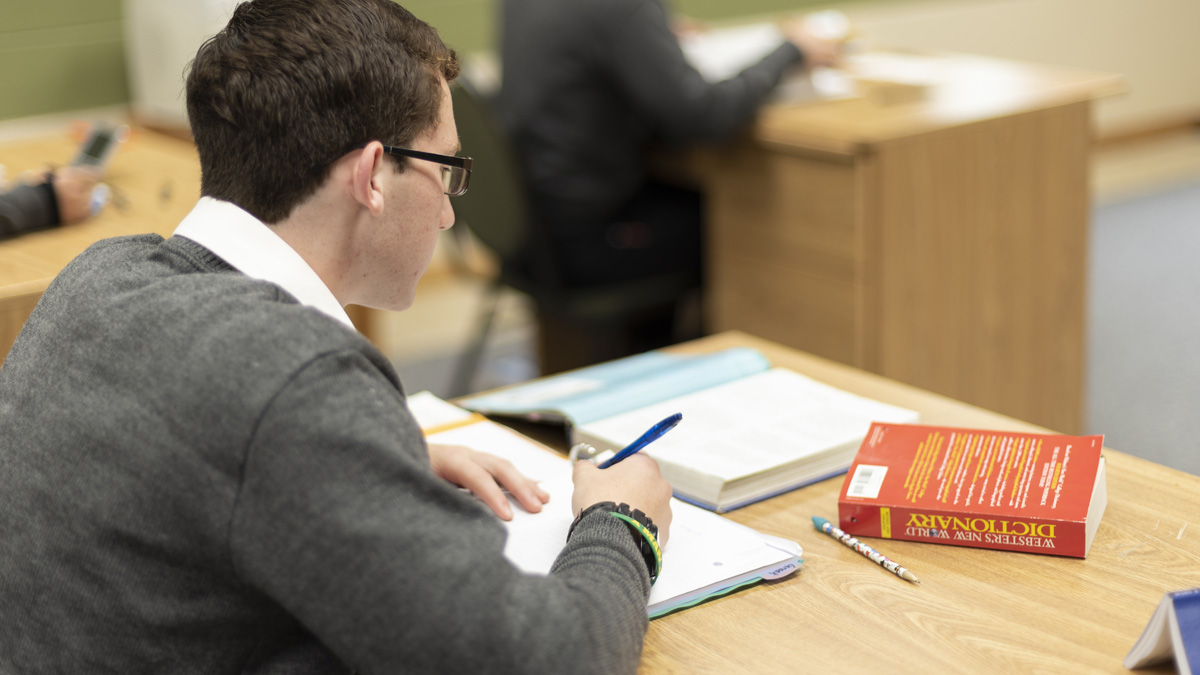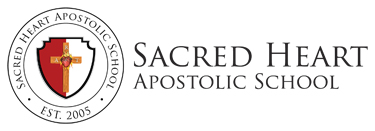
British Literature
This course provides a survey of English literature with particular focus on writing mechanics in various prose and poetry styles. Students pursue the goal of knowing and loving “the King’s good English” by tracing its development from the Anglo-Saxon period to the twentieth century. Students examine works from the canon of English literature and develop a vocabulary of literary terms. Special emphasis on literary explication encourages deeper analysis of texts. This course also promotes practical vocabulary building in preparation for the SAT. Regular attention to spelling, language mechanics, and critical thinking permeate the general content areas.
Trigonometry/Pre-Calculus
In Pre-Calculus, students deepen their understanding of function and its usefulness to explain phenomena in the created world. We incorporate graphing calculators to enhance students’ presentation of mathematics in any of four methods: verbal, numeric, algebraic, graphic. They study algebra with polynomial and exponential functions, trigonometry. They connect their geometry concepts into trigonometry, vector algebra, three-dimensional geometry, and conic sections. They conclude the year with a brief introduction to the derivative and integral from calculus.
Physics
This course is about the science of motion, the mathematical description of it, its causes, and its effects. It will include both graphical and algebraic analysis of moving objects. A couple of calculus-based applications will be used for labs. Skill will be developed in the use of equation manipulation and problem solving. A few well-chosen laboratory experiments will help solidify what is learned in the classroom. Mechanics will be the main focus of the curriculum. Such classical topics as velocity and acceleration, projectile motion, vector calculation of actual motion, forces and movement, gravity, and momentum as well as work, energy and simple machines. Various topics in astronomy will be covered through documentaries and visiting a local digital planetarium as well as participating in astronomical events as they occur.
American History
This course is a survey study of United States history from the end of the Colonial Era through the present. In addition to learning the primary historical facts and understanding the major movements in the development of the U.S., students will be expected to comprehend the philosophic concepts which have distinguished this nation from its founding to the present. The goal of the course is to give the students a thorough understanding of the events, issues, ideas, and people that have shaped our nation beginning to the present. The course begins with the founding of the American Republic, the Revolutionary War, and the writing of the Constitution. This is followed by the Jacksonian Era and the sectionalism leading up to the Civil War and Reconstruction. The class continues with the rise of modern industrialism, agrarian unrest, social and economic legislation, progressivism, the United States as a world power, the Depression and the New Deal, and concludes with political and cultural history of the United States since 1945, with emphasis on America’s role as a world power.
Latin
Students are now ready to translate original works of the great Roman authors. They begin reading, translating, and commenting on Virgil’s Aeneid, and at the same time reviewing all of the grammar as they come across it in the text. They learn the principles of Latin poetry, especially the dactylic hexameter line used in the Aeneid. Tests include scansion of verses and translation of short unseen passages, as well as longer passages that have already been studied.
Spanish
At this point the students should be familiar with the basics of Spanish, which they have covered with the Pimsleur method. If they have not finished all the Pimsleur lessons, they complete that course at the beginning of the year. They then begin to work on mastering Spanish grammar. Using The Ultimate Spanish Review and Practice workbook by McGraw-Hill, students review basic verb forms and are introduced to more complex grammatical constructions using the subjunctive mood. The book offers clear, concise grammar explanations, as well as abundant exercises so that students can practice the rules they learn, while learning new vocabulary drawn from everyday conversation.
Greek II
The class is an introduction to the essential elements of Greek New Testament grammar with the ultimate goal of enabling the student to read the New Testament in its original language. Using the Basics of Biblical Greek by William D. Mounce, students are introduced to the Greek language beginning with the alphabet, and then learning the forms of nouns, adjectives and verbs, as well as basic Greek syntax. Each chapter gives the student about 15-20 new vocabulary words chosen from the most frequently used words in the New Testament. At the end of each vocabulary list, the book offers the student an encouraging assessment of his progress in building vocabulary by reminding him of the number of New Testament words he has learned to date and the percentage of all words he knows in the New Testament. By Chapter 35, the final chapter of the book, he will have seen 80 percent of all New Testament words in his vocabulary lists. Each chapter has an accompanying exercise lesson using New Testament verses in which the student translates from Greek to English, practicing what he has learned in the corresponding chapter.
Religion
The purpose of the course is to give the students a general knowledge and appreciation of the Sacred Scripture. Through their study of the Bible, they will come to encounter the living Word of God, Jesus Christ. The course presents a Catholic approach to the Sacred Scripture, highlighting the theme of covenant. The students will learn how to read the Sacred Scripture and will become familiar with the major sections of the Bible and the books included in each section. The students will pay particular attention to the Gospels, where they may grow to know and love Jesus Christ more personally.
Physical Education
Daily physical education is an essential part of the Sacred Heart Apostolic School program. We believe that sports provide not only the physical and mental rest necessary for the student’s balanced growth but also the opportunity to form character and virtue and to thoroughly enjoy one’s growing abilities. At least one hour a day is allotted for intramural soccer, basketball, hockey, football, volleyball, and other sports.
On alternating Saturdays, the students have a chance to enjoy nature off campus at local parks or work on the grounds around the campus.
Music
The students begin their year-round study of classical music in the Summer Course. They begin with an introduction to the instruments of the orchestra and some musical forms. The course is cyclic and over a three-year span covers the Middles Ages, Renaissance, the Baroque Period, the Classical Period, and the Romantic Period. Audiovisual presentations are the prime medium used to familiarize the students with the music as well as to cultivate an appreciation for the various styles.

